Fact: The OAS – The Organisation Armee Secrete (the Secret Armed Organisation), was composed of ex-French Army soldiers who opposed French President Charles de Gaulle’s policy of granting independence to Algeria as they considered it and its French population as French. The organization aimed to kill de Gaulle and bring Algeria back under French rule.
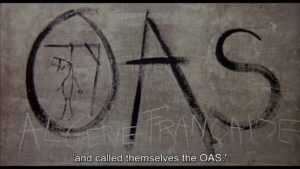
They carried out many attempts on de Gaulle’s life. The film starts with one such attempt where an ambush by the OAS in a Paris suburb leaves de Gaulle unhurt. The attempt was real and the conspirators were soon running for their lives. The conspirators are caught, and the French Secret Services relentlessly hunt the OAS members.
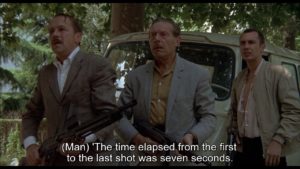
Fiction: The OAS heads decide that the only way to kill de Gaulle is to bring in an outsider who is not on French records.
Enter the nameless Englishman who agrees to do the job and gives the code name Jackal and sets out planning the assassination meticulously. He leaves nothing to chance and creates three false identity cards.
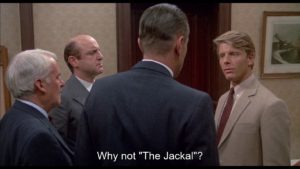
The French Intelligence knows that something is going on as the top three OAS officers are holed up in a hotel in Rome. They kidnap the courier who gets the daily mail for the trio and tortures him, and he reveals only the name, Jackal.
The manhunt is on.
Claude Lebel, the French detective assigned to the job, soon gets going, asking various allied intelligence and police services for help. The British end comes through and the British are worried that a British citizen may be involved in an assassination plot to kill the French President. So they go all the way to ensure that nothing is left to chance and start producing the results.
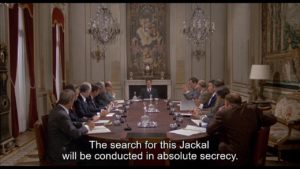
The Jackal is always one step ahead thanks to his access to the ministerial group that is tracking him.
Fred Zinneman the director, has this penchant for stories that pit characters against impossible odds. His most famous example is High Noon (1952), where the town Sherriff (Gary Cooper) takes on vicious criminals against the wishes of the local population he had been protecting. From Here to Eternity has two such characters, Lee Prewitt (Montgomery Clift) and Sergeant Warden (Burt Lancaster), who go against the well-established Army rules and, in the case of Prewitt, disobey his superior because of his conscience. Yet another example is Behold a Pale Horse (1964), where ex republican Manuel (Gregory Peck) returns to his native Spain while being tracked by the Police in the form of Vinolas (Anthony Quinn).
All these films, have a central character who is mainly on the “right” of everything that is “right”. This time the story and the script completely subverts us to the Jackal’s point of view, and we want him to succeed. We know that de Gaulle died peacefully in 1972. So how can this story set in 1963 end, and subvert us to take Jackal’s side? Especially a man who speaks less, is obviously intelligent, smart, speaks multiple languages, is sophisticated, and most importantly, a committed professional. His nemesis Claude Lebel (Michael Lonsdale), is an equally committed professional. Both of them single-mindedly pursue their goals. While the Jackal has his anonymity, Lebel has his intelligence and the entire state apparatus behind him.
Many subtle moral questions are woven into the film’s thread, which is where the film is still relevant. No doubt the technology is “old” – rotary dial phones, typewriters, registration cards, card indexes etc. Still, these are all means to an end. These are all only tools and implements for the state to get its job done – much like the internet and computers and everything that goes with it. The film is probably one of the earliest to show how easy it was to get a new identity by presenting a birth certificate. No one bothered to check whether the birth certificate for one person had a death certificate. This technique was well used by Soviet “Illegals” to set themselves up in the West as genuine civilians.
It may all look boring on film, but the fact remains that most intelligence work is the careful assembling of facts that Claude Lebel manages continuously. He is as professional as the Jackal.
There is a shot where the Jackal knows that he has been “blown”, and he is in front of a signboard that points left – towards Paris – and right, towards the Italian border. He takes the left fork. This is where we suddenly marvel at his quiet confidence, composure, and professionalism.
In fact, in the film, everyone is a professional. The gunsmith is the best example. He asks whether the target will be stationary or moving, whether he will go for a headshot or a chest shot, and so on. They might as well be discussing the mechanics of good cooking.
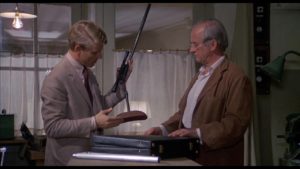
The Jackal then meticulously zeros the gun in a forest and finally uses the deadly mercury-tipped bullet to explode the target – a watermelon. We can only speculate with horror what would happen to a human head.
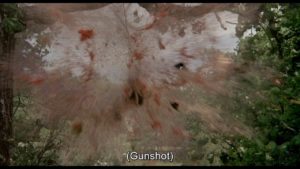
The film can be easily classified into various genres. Spy Film. Conspiracy Film. Assassination film – in fact, the 1993 Clint Eastwood thriller In the Line of fire is very much reminiscent of Day of the Jackal except that the assassin (John Malkovich) keeps on taunting the Secret Service.
The grand finale was shot at various locations during Liberation Day. It shows in multiple locations as the troops do their duty, oblivious of the cameras. Unprecedented access was given to the film crew to shoot at various real locations, which were then intercut with the studio sets.
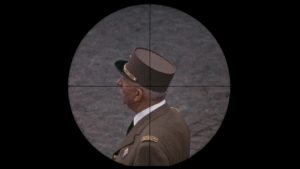
Frederick Forsyth based the story on his experiences as a journalist across various situations. A story goes thus: Many publishers rejected the book as far-fetched. Finally, Hutchinson published it and it was a roaring success. One of the earlier publishers to whom he had taken it apparently fired its entire staff for ignoring the goldmine. That’s the story, but we probably need to take it with a pinch of salt.
All said and done, at the end of the day, it is riveting even today. Any story that is in keeping with the historical outcome has to be well plotted, and the film remains true to the book’s essence.
Avoid the 1997 “remake” The Jackal starring Bruce Willis in the title role. The premise? A Russian mobster wants to knock off the American President. And who can get the Jackal? an ex-IRA terrorist (Richard Gere’s “Irish accent” is a mirth quake)
For some strange reason, it’s not available on Amazon India but is there on Amazon US. It’s “Buy or Rent” under YouTube.
Real History/ Historical background – 4 out of 5
Script – 5 out of 5
Story – 4 out of 5
Direction – 5 out of 5
Overall Rating – 4.5 out of 5
Hi Ramesh,
A final salute to the great author who passed on June 9. Thank you, Mr. Forsyth, for the thrilling novels! Was at least some of the fiction actually fact? We will never fully know.. As the below article writes: he so often ‘caught lightning in a bottle’…
From the Washington Post:
Frederick Forsyth, thriller writer of ‘Day of the Jackal,’ dies at 86.
He wrote more than 20 novels, short stories and other works, selling more than 75 million copies in over a dozen languages.
Frederick Forsyth, a mega-selling British novelist of political thrillers, cunning spy craft and globe-trotting intrigue who used his own background as a foreign correspondent to inspire such page-turners as “The Day of the Jackal,” “The Odessa File” and “The Dogs of War,” died June 9 at his home in Buckinghamshire, a county in southeast England. He was 86.
The literary agency Curtis Brown, which represented him, announced the death but did not cite a cause.
For a half-century, Mr. Forsyth was one of the most successful authors of the cloak-and-dagger circuit. He wrote more than 20 novels, short stories and other works, reportedly selling more than 75 million copies in more than a dozen languages. Many of his books, featuring high-stakes action and protagonists pitted against seemingly impossible odds, were made into movies or TV dramas.
Unlike John le Carré, a contemporary who delved into the moral ambiguities of Cold War espionage, Mr. Forsyth never pretended to be anything other than, by his own description, “just a storyteller.” Book critics were generally kind, often praising his blistering plot pace and meticulous attention to detail.
Mr. Forsyth’s style was credited with helping launch the genre of “documentary thrillers”: taut storylines of hunters and the hunted, references to real people and agencies, and tight-aperture descriptions right down to the interlocking parts of a gun or the green canvas boot covers worn by mercenaries in West Africa.
To many fans, Mr. Forsyth was a chap who knew the score. The world can be dark and cutthroat. Leaders can be weak and misguided. A hero must follow his gut (“his” because most of Mr. Forsyth’s books are heavy on the testosterone) and not just obey orders from paper-pushing handlers at MI6 or Langley.
A consummate raconteur and multilingual bon vivant in his foghorn baritone, Mr. Forsyth had a background as adventuresome as his books. He was a Royal Air Force pilot at 18, one of the youngest in Britain. He then began his roving journalism career in 1958, covering an attempted assassination of French President Charles de Gaulle in 1962 as well as other stories across the Soviet bloc and in conflict zones in Africa. Later, as a novelist, he moonlighted for British intelligence — running delivery “errands” amid his travels, he said.
He began writing novels at a low point. After an early stint with Reuters, he quit the BBC in 1968 while serving as assistant diplomatic correspondent. He accused his bosses of being more interested in toeing the government line in the former British protectorate of Nigeria than reporting the “horror” of the famine and repression in the Biafra region fighting to secede.
He worked as a freelancer reporting the Biafran side of the story before writing a nonfiction book, “The Biafra Story,” to little notice. Over Christmas 1969 he was back in Britain — “literally broke,” he said. That’s when Mr. Forsyth, who had mulled for years the attempted assassination of De Gaulle as scaffolding for a novel, spent a little over a month at the typewriter and finished the manuscript for “The Day of the Jackal” with the aid of many packs of Rothmans cigarettes.
The book was about a French paramilitary outfit that hires a remorseless British hit man known only as “the Jackal.” The tensions build on a collision course between the hired killer and an unassuming French police detective racing to stop him. The first four publishers who were pitched “Jackal” didn’t understand the book, Mr. Forsyth later told The Washington Post: “The point was not whodunit, but how, and how close would he get?”
Then in 1971, a London-based publisher, Hutchinson & Co., took a chance. Sales soared, driven mostly by word of mouth. Viking Press grabbed the U.S. rights for a reported $365,000 — a major sum for a rookie author. Positive reviews in the New York Times helped boost sales and jolted him to the top of the bestseller lists.
In 1972, Mr. Forsyth won the Mystery Writers of America’s Edgar Allan Poe Award for best novel. An acclaimed 1973 film, directed by Fred Zinnemann, starred Edward Fox as the Jackal and Michael Lonsdale as the French police official. Adding to the book’s aura, a Guardian reporter coined the name Carlos the Jackal for fugitive Venezuelan political terrorist Ilich Ramírez Sánchez in 1975 after spotting Mr. Forsyth’s thriller in a raided London apartment. (Sánchez was captured in 1994.)
Catapulted to public notice, Mr. Forsyth gabbed with Johnny Carson on “The Tonight Show” and charmed the audience with irreverent zingers on politics and world affairs in his slightly posh accent honed at the BBC.
“He caught lightning in a bottle with ‘Day of the Jackal,’ ” Barry Forshaw, a British crime fiction writer, said in a 2022 interview for this obituary. “Forsyth wasn’t one of the great writers among his contemporaries in terms of developing characters or exploring moral quandaries. But he knew he had a winning formula and stuck with it.”
Mr. Forsyth kept a prolific pace, chopping away with “two fingers and a thumb for the space bar” — first on his beloved vintage manual typewriters and, more recently, on a Silver Reed electric model. He made corrections in pen.
Even before “Jackal” became a success, he was busy working on his next book: “The Odessa File” (1972) about a reporter in 1960s West Germany tracking a former Nazi concentration camp commander and probing a clique of former SS members. Nazi-hunter Simon Wiesenthal helped with the research.
Fiction and fact came perilously close amid the release of “The Dogs of War” (1974), about mercenaries seeking to depose the leader of a fictional country based on the Central African nation of Equatorial Guinea. The Sunday Times of London investigative team in 1978 uncovered details alleging that Mr. Forsyth had a role in organizing an unsuccessful 1973 coup plot in Equatorial Guinea, seeking to create a new homeland for Biafran refugees. Thirteen suspected mercenaries apparently recruited for the job were arrested in Spain.
For years, Mr. Forsyth offered caveat-shaded denials. But to the Sunday Times in 2006, he belatedly acknowledged that he had met with soldiers of fortune to discuss what it would take to pull off a coup. And he may have dropped some money, too, but it was all part of book research, he insisted.
“I took part in the plot inasmuch as I was chewing the fat and shooting the breeze with the others involved,” Mr. Forsyth told the newspaper. “But as far as I was concerned, any money I gave was for information and I pulled out before the plan was put into practice.”
In 2009, Mr. Forsyth found himself in the middle of another African coup, this time in Guinea-Bissau while doing research for “The Cobra” (2011). Mr. Forsyth described being roused in his hotel room by a blast. It was the roof coming down on the villa of President João Bernardo Vieira, who stumbled from the debris and was later hacked to death with machetes.
“Look, hey, I passed my 70th birthday last fall,” he told NPR a week after the coup, “and 40 years ago I used to dodge bullets in Africa, but I’m getting too old.”
Boyhood during war
Frederick McCarthy Forsyth was born Aug. 25, 1938, in Ashford, a town close enough to the English Channel to get spillover fog. He described his parents as “middle-class shopkeepers,” for a time running a furrier shop.
An only child, Mr. Forsyth got full run of the top floor of the family’s Edwardian-era house. By 5, he was watching Allied troops assembling around Ashford. From Americans, he discovered chewing gum. A British flier let him sit in the cockpit of a Supermarine Spitfire. It began a love of aviation that led to Mr. Forsyth getting his Royal Air Force wings at 18.
By the time Mr. Forsyth was sent to Tonbridge School in Kent at 13, he had solid command of French and German from summers spent with host families in each country after the war. He also had a smattering of Russian from an exiled countess in Paris and, at 17, spent three months in Spain on scholarship to the University of Granada. Mr. Forsyth said he blew off classes and took bullfighting lessons.
Mr. Forsyth thought the RAF was his future, until the reality of peacetime assignments sunk in. He left the military after four years, then joined the Eastern Daily Press in Norwich covering the courts and every quotidian twist in sleepy King’s Lynn: births, marriages, deaths and local festivals. In 1961, he roamed London’s Fleet Street trying find a foothold at a bigger paper. Through an acquaintance and his proficiency in French, he became a Paris correspondent for Reuters.
Admittedly a libertine in those years, he had a one-night fling with a female Czech secret police agent that included skinny dipping in a lake near Prague, he recounted. And his journalism stint for Reuters in East Berlin ended in 1964 when he learned at a bar — courtesy of “two buzz-cut Americans who screamed CIA” — that he was having an affair with the mistress of the East German defense minister.
“It was not the minister I worried about,” he wrote for an Atlantic Council publication. “It was his political enemies who would love to arrange his downfall and a show trial for me.”
His first marriage, to Carole Cunningham, ended in divorce. They had two sons, Stuart and Shane. In 1994, he married Sandy Molloy. Information on survivors was not immediately available.
Mr. Forsyth’s long run of fictional plots often shadowed real headlines: Iraq and Afghanistan (“The Fist of God,” 1994; “The Afghan” in 2006); Moscow’s confrontations with the West (1982’s “The Devil’s Alternative”); and in 2018, “The Fox,” a tale of a computer hacker savant recruited to bring digital havoc to Iran, North Korea and Russia.
Mr. Forsyth tried his hand at other subjects, including the novel “The Phantom of Manhattan” (1999), a sequel to Andrew Lloyd Webber’s stage hit “The Phantom of the Opera,” and a Wild West novella of love and heartbreak, “Whispering Wind” (2011). He also wrote a memoir, “The Outsider: My Life in Intrigue” (2015).
In a long-running column for Britain’s Daily Express, he pushed his support for Britain’s “Brexit” with the European Union, lambasted Labour governments and trumpeted his personal stances such as opposition to women in military combat roles. Mr. Forsyth’s conservative political views also informed his 1984 book “The Fourth Protocol,” in which Soviets hatch a plot to bring in a Labour government to embrace Marxism, turn its back on NATO and reject Western nuclear accords to do Moscow’s bidding.
He was appointed a commander of the Order of the British Empire in 1997.
Into his later years, Mr. Forsyth remained resolutely old-fashioned. He refused to carry a cellphone and sometimes stopped strangers to ask for theirs to make a quick call. His research was also mostly old school: Trying to avoid websites or books in favor of talking to experts in dark arts such as forgery or creating an alias.
“So when people ask: ‘How on earth did you discover that?’ ” he told the Wall Street Journal in 2011, “I just say: ‘Shhhhh. I have friends in low places.’ ”
Thank you for the same. He was truly a master.